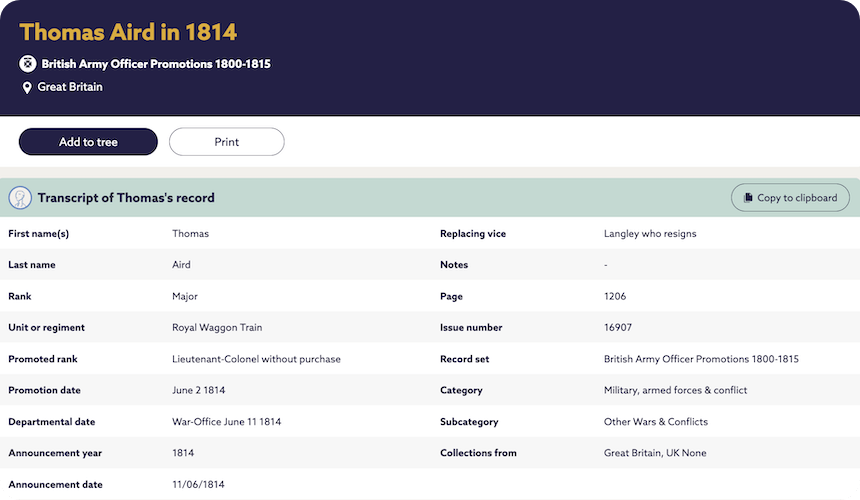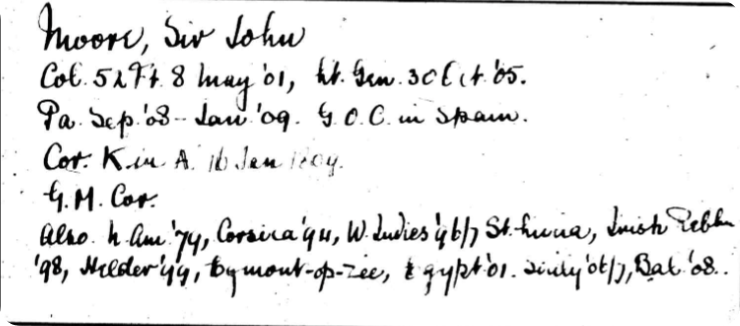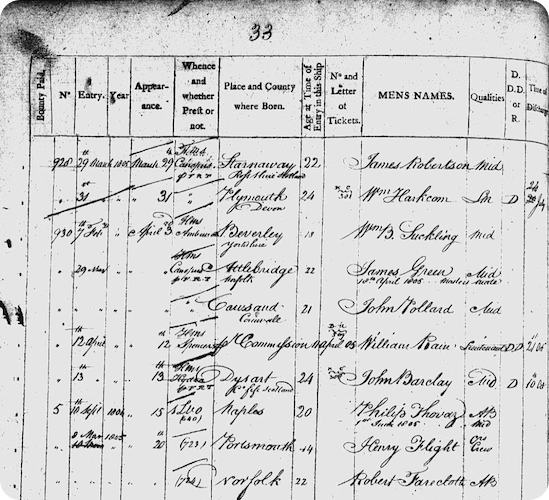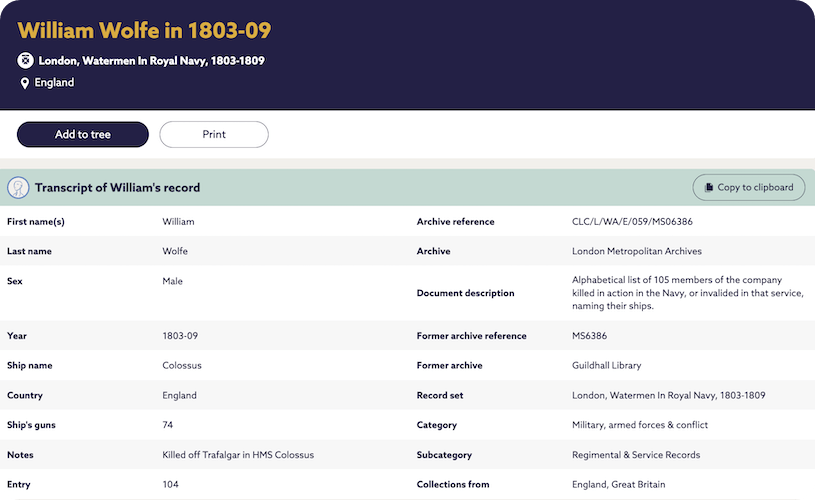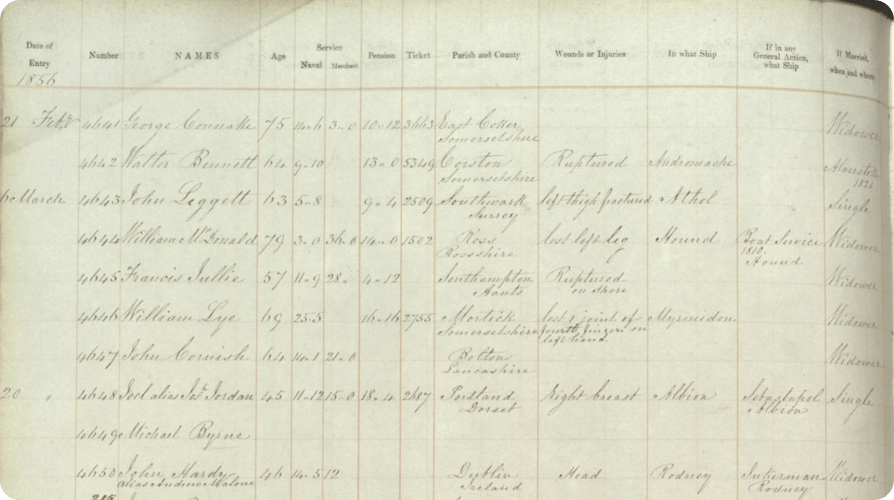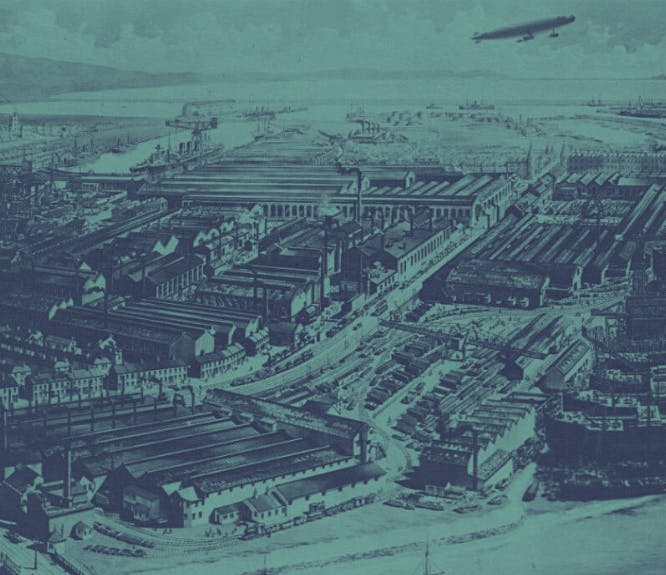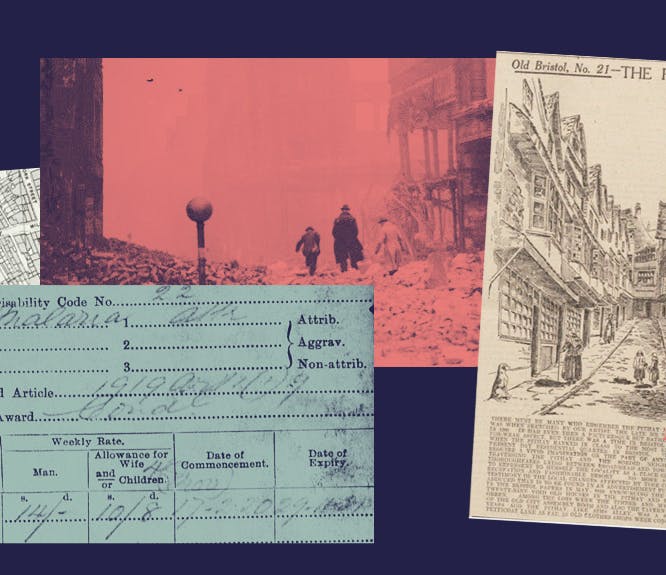Did your ancestors fight in the Napoleonic Wars? Here's how to find out
9-10 minute read
By Charlotte Ward Kelly | November 24, 2023
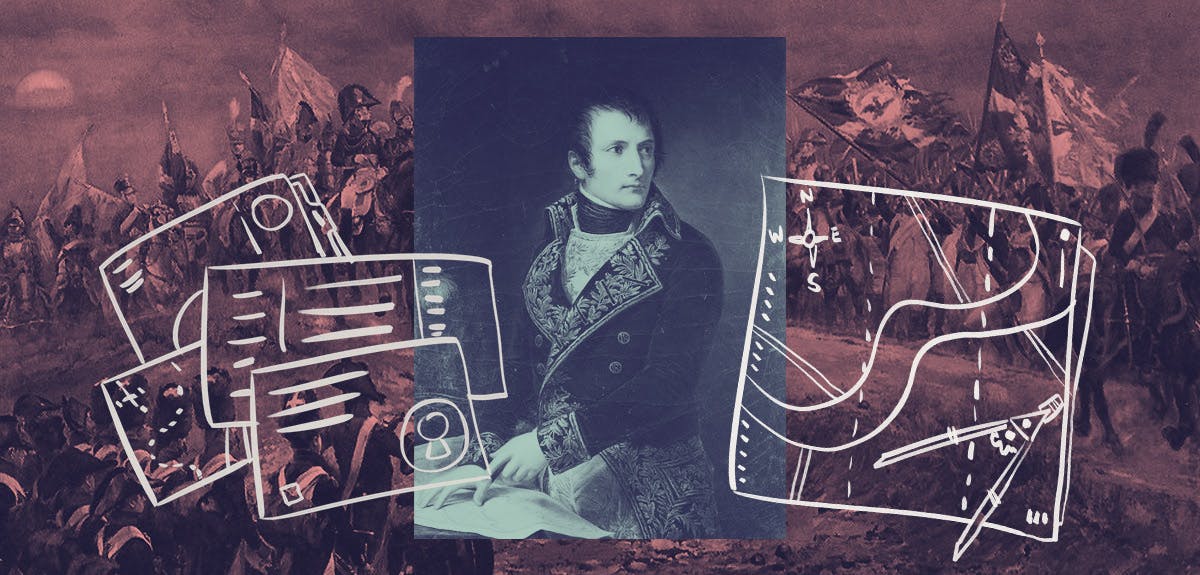
Starring Joaquin Phoenix, Ridley Scott’s 2023 epic tells the story of Napoleon Bonaparte’s rise to power, his relationship with Empress Josephine, and the campaigns of the Revolutionary and Napoleonic Wars. Use Findmypast’s records to find your Napoleonic ancestors and discover more about the history behind the movie.
Millions of men fought against Napoleon for Britain, on land and at sea, and took part in famous battles and campaigns including the Battle of Waterloo, the Battle of Trafalgar, the Battle of Leipzig, and the Peninsular War.
This beginner's guide to our Napoleonic War records will help you to determine whether your forebear was involved in these historic events. From medal rolls to navy log books, Findmypast has the records you need to unlock all manner of exciting family stories.
Napoleonic history explained
In 1789, the French Revolution gripped France. It would lead to the overthrow of the monarchy and execution of Louis XVI and Marie Antoinette, the Reign of Terror, war in Europe, the establishment of a republic, and a new constitution.
During the revolutionary period, Napoleon Bonaparte swiftly rose through the ranks of the French army. In 1799, he orchestrated a coup that overthrew the existing government and established the First Consul. In 1804, he crowned himself Emperor and set about conquering much of Europe.
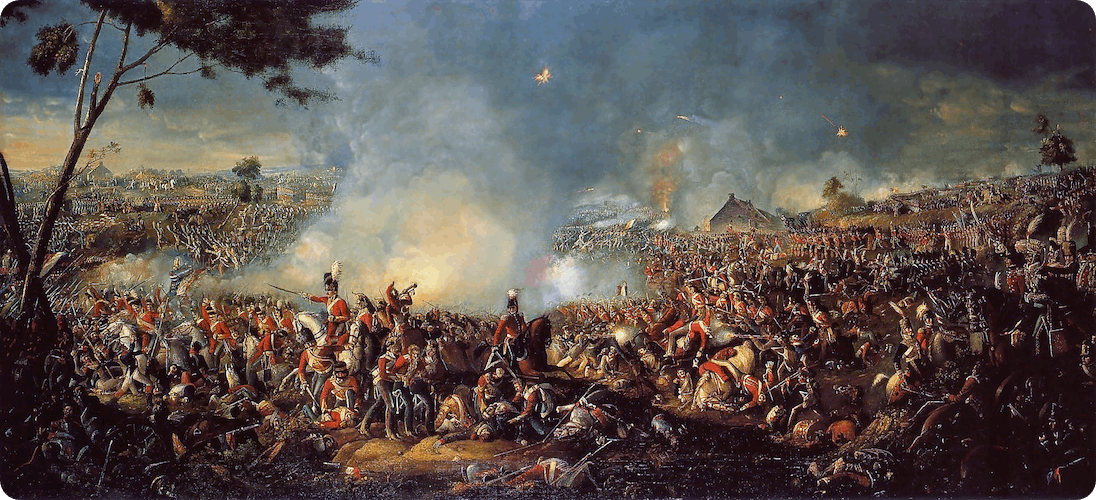
The Battle of Waterloo, depicted by William Sadler.
The Napoleonic Wars (1803-1815) were a series of conflicts between France and its client states and a series of coalitions of European powers that included Britain, Austria, Russia, Prussia, and the Netherlands.
The major phases of the Napoleonic Wars were as follows:
- The War of the Third Coalition (1805)
- The War of the Fourth Coalition (1806-1807)
- The Peninsular War (1808-1814)
- The War of the Fifth Coalition (1809)
- The French invasion of Russia in 1812
- The War of the Sixth Coalition (1812-1814)
- The war of the Seventh Coalition/ Hundred Days (1815)
Napoleon’s defeat at the Battle of Leipzig and his subsequent failed campaigns of 1814 led to his abdication and exile to the island of Elba. However, Napoleon returned to power for a brief period known as the Hundred Days in 1815.
The final showdown occurred at the Battle of Waterloo, where Napoleon was defeated by the British and Prussian forces led by the Duke of Wellington and Gebhard Leberecht von Blücher.
Napoleon was then exiled to the remote island of Saint Helena, where he died in 1821. The Napoleonic Wars had far-reaching consequences, reshaping the political map of Europe and influencing the course of history for years to come.
Millions fought and died on both sides. Here’s a guide for finding your British Napoleonic ancestors and uncovering fascinating stories from those who were there.
Finding your family within our British Army records
To find out if your ancestors played a role in these tumultuous events, look no further than our Napoleonic War Records collection.
Napoleonic War Records 1775-1817
Over 133,000 records are included in our set of Napoleonic War Records 1775-1817, making it the perfect starting point for your research. The details included in each record vary, but you will likely find names, a unit or regiment, status, year and the location of attestation.
This set includes 9,309 records from the Foot Guard Attestation Papers 1775-1817, almost a million Regimental Index records, and many more from the Army of the Reserve 1803.
In 1803, the British parliament passed an act to provide a stated number of men to make up an Army of Reserve. They were called up for the ‘defence of the realm’ at a time when there was a serious threat of invasion. The men were required to serve in Britain, for a period of around five years.
Waterloo Roll Call, 1815
One of the most famous battles in history, the Battle of Waterloo was fought on 18 June 1815, following Napoleon’s return from exile and the Hundred Days campaign. It was fought between France and a coalition under the command of the Duke of Wellington and Field Marshal Gebhard Leberecht von Blucher.
After hours of intense fighting, the French army was forced to retreat. Over 60,000 men lost their lives on the battlefield of Waterloo. Wellington said in the aftermath of the battle:
"My heart is broken by the terrible loss I have sustained in my old friends and companions and my poor soldiers. Believe me, nothing except a battle lost can be half so melancholy as a battle won."
Our Waterloo Roll Call collection lists 3,999 men - mainly British officers - who were present on the day of the battle. These records give basic information including a name and regiment, while some also contain detailed biographies in the attached image.
One officer included in the roll call is Sir William Howe De Lancey. Born in 1778, De Lancey rose to the rank of Colonel in the British Army and was appointed deputy quartermaster-general at Waterloo. On 4 April 1815, De Lancey married Magdalene. The newly married couple arrived in Brussels on 8 June 1815, as the British forces were preparing for another campaign (not yet realising it would happen so soon).
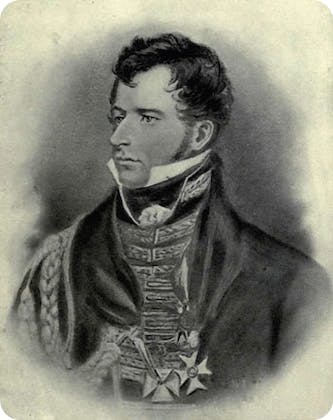
William Howe De Lancey.
Magdalene wrote A Week at Waterloo in 1815, one of the most important and moving accounts from the point of view of a military wife. On 14 June, Magdalene noted a flurry of activity around the town with the British forces, as a decisive battle was impending.

Madgalene De Lancey.
During the battle, De Lancey hit by a cannonball. Nursed by his wife, he died after a few agonising days.
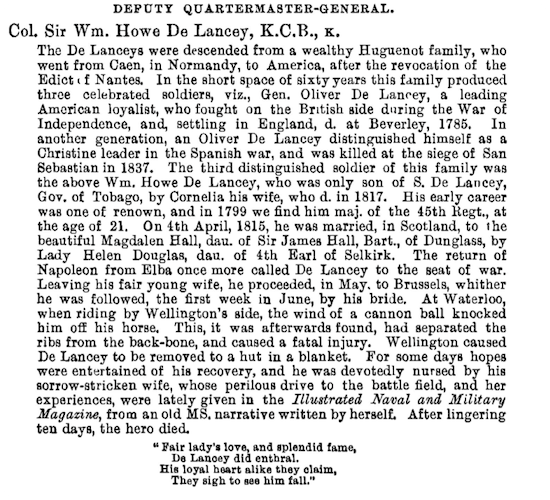
You can view De Lancey’s record for yourself here.
Britain Campaign Gallantry and Long Service Medals and Awards
Another key set for researching Napoleonic history is this collection of medals and awards, which includes the Waterloo Medal Roll. It contains the names of almost 37,000 men who fought in the battle.
The Waterloo Medal was the first military award issued by the British Government to every member of the British Army recorded in service at either the Battle of Ligny, the Battle of Quatre Bras, or the Battle of Waterloo. It was also the first to be issued to the families of soldiers killed in battle.
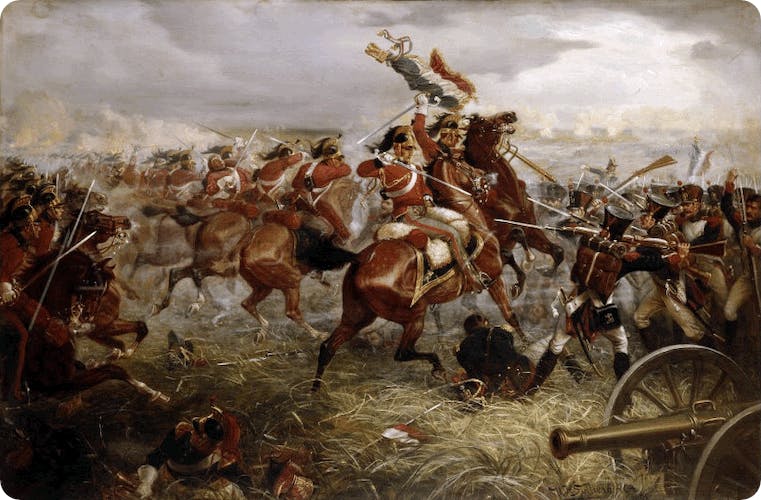
The Battle of Waterloo.
Details included in these records can vary, but you’ll typically find names, rank, regiment, sub-unit, and the medal type. It is a great place to start or to check to see if your military ancestor was at Waterloo.
One soldier found in this records is Francis Styles. Styles served in the 1st Dragoons, a cavalry unit, at Waterloo. During the battle, Styles and Captain Alexander Kennedy Clarke found themselves in the midst of fighting when they captured one of the two French Imperial Eagles.
Sykes died in 1828, and his medal was lost until 2020, when it was spotted for sale on eBay and purchased by the Household Cavalry Museum.
British Army Officer Promotions 1800-1815
This set contains the names of officers whose promotions were announced in the London Gazette, 1800-1815.
Within these 24,678 records, you’ll find information including a name, rank, unit or regiment, status, date of promotion, and more.
Peninsular War British Army Officers 1808-1814
The Peninsular War (1808-1814) was a conflict during the Napoleonic Wars that took place on the Iberian Peninsula, fought between the French Empire and the allied armies of Spain, Portugal, and Britain.
After World War 1, Captain Lionel S Challis of the Queen’s Westminster Rifles gathered the names of more than 9,600 officers involved in the Peninsular War.
Using this collection, you can explore stories like that of Sir John Moore – who took command of the British forces in the Iberian Peninsula but was fatally wounded at the Battle of Corunna on 16 January 1809.
Although he died from his injuries, Moore survived long enough to hear of his army’s victory.
Finding your seafaring ancestors
Britain’s Royal Navy played a significant role in the Napoleonic Wars. Over 130,000 men from across Britain and her territories served in the Royal Navy. The Navy’s role was to protect Britain from invasion, her trade routes and overseas territories, to blockade the French navy, and to support land campaigns through resupply.
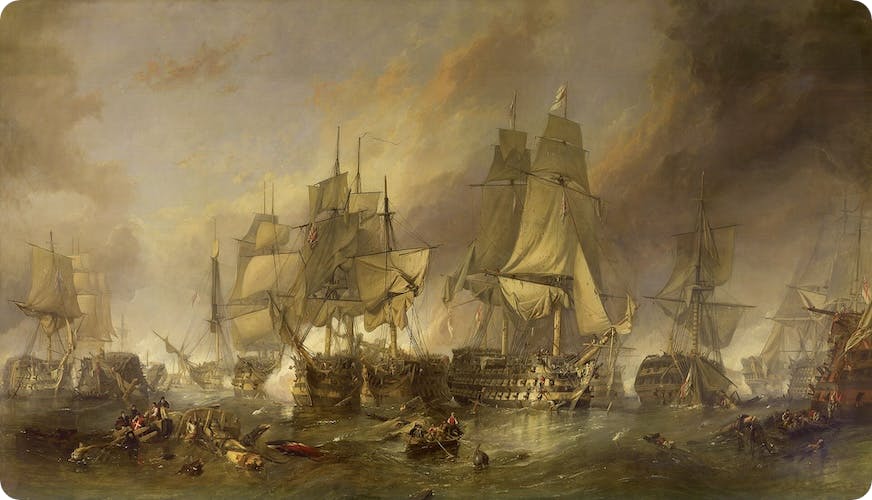
The Battle of Trafalgar, painted by William Clarkson Stanfield.
Perhaps the most famous sea battle in history, the Battle of Trafalgar (21 October 1805) was a decisive victory for Britain against the combined Franco-Spanish Fleet. Though Nelson died, Trafalgar ensured Britain’s unchallenged dominance of the seas and the protection of the country, her trade routes, and overseas territories.
Here’s how to find your ancestors who served in Britain’s Royal Navy during the Napoleonic Wars.
British Royal Navy Ship Musters
Prior to the introduction of service records for the navy in 1853, each ship would keep a ‘muster roll’ (log book) of all of the seamen aboard. The amount of detail recorded varied from ship to ship, but you will likely find name, age, place of birth, year enlisted, muster year, ship name, previous ship served on or if impressed, rank.
Our collection of muster rolls spans 1739 to 1861, and includes records for several ships active during the Napoleonic Wars, including Victory.
To search these records, start with the name of your ancestor and then add additional information, such as birth place or ship name.
London, Watermen in the Royal Navy 1803-1809
In the eighteenth century, the Thames was the fastest and easiest way to travel and transport goods across London. Watermen were employed on the river to ferry passengers and carry cargo and many either volunteered or were pressed into the Royal Navy during the Napoleonic Wars.
The transcripts in this collection were created from two documents held at the London Metropolitan Archive. You can expect to find a name, ship name, number of guns onboard, and details of death or injury.
For example, we can learn from this set how William Wolfe was killed off Trafalgar in HMS Colossus.
The records also include 8 names of watermen who served on Lord Nelson’s flagship HMS Victory.
Royal Navy and Royal Marines pensions and wills
We have a few record sets that include records for Royal Navy and Royal Marines pensions and wills - Wills of Royal Navy and Royal Marines Personnel 1786-1882, British Royal Navy and Royal Marines Service and Pension Records 1704 - 1939, and British Royal Navy & Royal Marines Service and Pension Records Browse, 1704-1919.
These are a great place to start finding your naval Napoleonic ancestors as you will find information that can include name, date of will, ship served on, attestation year, length of service, discharge year, death date, and next of kin details.
On joining the navy or a ship, a seaman might write his will detailing who his benefactors were and what they would get in the event of his death. These would then be deposited in the Navy Office with instructions to issue cheques and the amounts.
Prisoners of War records
We also have over 1 million records from the Napoleonic Wars in our Prisoner of War 1715-1945 collection. These records from The National Archives include French, Dutch, Spanish, Danish, and American held in Britain, on British ships, and in British territories around the world.
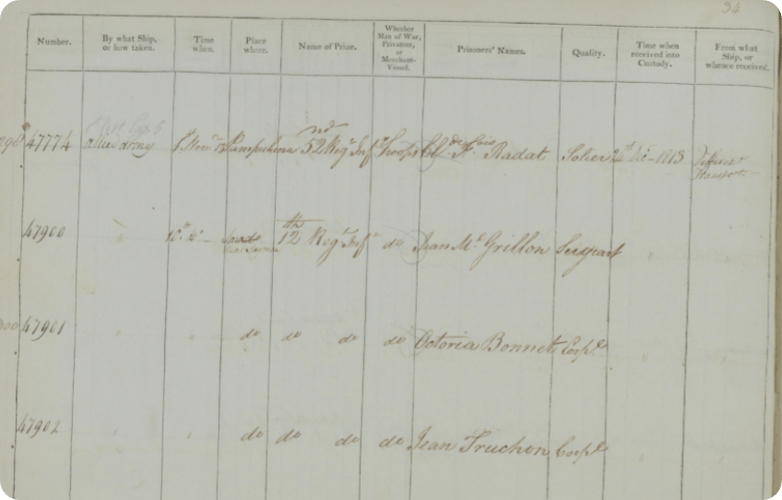
Prisoners of War held in on the Temeraire, 1813. Explore this record.
They also include captured and released British prisoners of war.
Uncover the stories of your military ancestors
From all across the British Empire and beyond, we have over 51 million military and conflict records available for you to explore. Whether you've got roots in Britain, the United States, Australia, New Zealand or further afield, tracing the lives of the military heroes within your family has never been easier.
For that crucial context, why not delve into our History Hub? From the military in the 1921 Census to WW1 prisoners of war, there are so many fascinating stories to discover.
